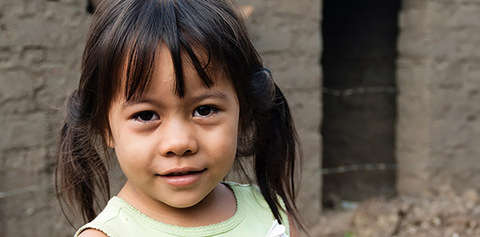About

Fighting poverty in all its forms
Operating alongside our partners and building durable solutions in parts of the world where it has proven most challenging to eradicate poverty — in the Global South and conflict-affected areas — the Pulte Institute uses research in policy and practice to make a tangible impact on at-risk populations across the globe.
As we continue our mission to improve lives, these features make our work stand out in the fight against poverty:
- We leverage the strengths of diverse perspectives and disciplines to address poverty's various facets.
- We recognize that solutions can only be found by working in and with front-line communities.
- We understand that lasting change requires a commitment to translating findings into global policy and practice.
This distinctiveness is achieved through the various forms our research takes:
-
Policy and Program Evaluation: The Institute evaluates the effectiveness of existing policies and programs and identifies how to scale their impacts to meet the needs of the most vulnerable.
-
System Strengthening: The Institute develops and applies novel diagnostic tools to uncover why poverty persists and where to focus our efforts and investments to strengthen systems.
-
Innovation and Co-Creation: The Institute works with local partners to innovate new policies, programs, and interventions, along with the evidence base necessary to ensure they can be sustained and faithfully replicated.
“It is a grim outlook for billions of people living below the poverty line globally. We need to reverse the status quo,” William J. Pulte Director Tracy Kijewski-Correa says. “Just as poverty is more than a lack of material wealth, it is also often tied to systemic inequality and marginalization from society. The complexity of these issues demands that we — as a Catholic University — consider how these conditions impact the whole person and each person’s ability to fully flourish.”
The Pulte Institute is also mobilizing its global networks SHARE (Supporting Holistic and Actionable Research in Education), CARA (Central America Research Alliance), and FLARE (Forests and Livelihoods: Assessment, Research, and Engagement) to create more opportunities for faculty and students to engage in research on global education, migration, and climate change as part of the University's new Poverty Initiative as outlined in Notre Dame 2033: A Strategic Framework.
Progress on the complex issue of poverty and its intersections with systematic factors requires domestic and international policy and humanitarian assistance to converge in new ways. A truly sustainable approach can only be implemented with committed partnerships, world-class expertise, and the research infrastructure that the Pulte Institute brings to bear.
About
The Pulte Institute for Global Development — an integral part of the Keough School of Global Affairs at the University of Notre Dame — combines established faculty renowned for teaching and research excellence with a dedicated team of experienced international development professionals to shape policy based on research on issues such as poverty, sustainability, and education.
The Pulte Institute cuts across academic fields to produce multidisciplinary knowledge on complex development challenges in areas related to:
- Sustainability
- Just Systems and Effective States
- Education
- Housing, Migration, and Resettlement
- Entrepreneurship
In addition to working creatively and collaboratively with faculty, researchers, and students across the University of Notre Dame, the Institute maximizes our impact through partnerships with government agencies, non-governmental agencies, humanitarian organizations, foundations, individual benefactors, and private corporations in the U.S. and overseas.
The Pulte Institute, consistent with Notre Dame's mission "to create a sense of human solidarity and concern for the common good," is dedicated to upholding ethical values, enriching knowledge, preparing students for leadership positions, and deeply respecting diverse cultures, religions, and political systems.
Annual Review
If you would like to receive a physical copy of our Annual Review, please contact Cassidy O'Block: